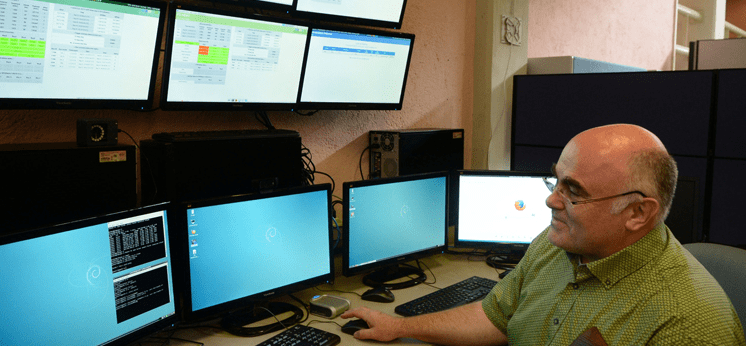
Cleverly sharing workload across time zones
By remote controlling the Argentinian Pierre Auger Observatory through research & education networks, international scientists share the heavy workload of operating the observatory 24/7.
Global remote access
Currently there are three remote control rooms in Germany, one in Spain, and one in México. Others are about to begin operations in France, Italy, and in the US.
“The remote control rooms help collaboration as well as saving travel expenses. They allow us to operate the observatory’s fluorescence detectors without traveling to the observatory, located in the remote province of Mendoza near the Andes Mountains,” says Dr. Lukas Nellen, responsible for the Mexican control room (see image above).
“The time difference of seven hours and the fact that the observatory is located between Europe and Mexico allows us to split shifts 12 hours to 6 hours.
“We can take the first turn and finish around 23:00 hours, which corresponds to 6:00 hours in Europe, and shifts are not as heavy for the personnel operating the equipment,”Dr. Nellen explains.
“Also, the reduced cost of operation makes it possible to consider extending the periods of operation of the fluorescence detectors without significantly increasing operating costs.”
Distribution to physicists
The traffic from the Pierre Auger Observatory goes through a number of research & education networks and is distributed to the more than 500 physicists around the world collaborating to maintain the site and analyse its data.
The Pierre Auger collaboration initiated the development of remote control rooms a couple of years ago and they have been in regular operation since 2014.
Dr. Lukas Nellen elaborates:
“We have come a long way since the start in 2005. As an example, the AugerAccess project, financed by the European Community, contributed to the installation of optical fibre in the observatory.
“Initially we had satellite and microwave connections, but none of these means of transportation had the bandwidth and quality of service required. Having a good network service is important not only for remote operations, but also for access to the data coming from the observatory.”
For more information please contact our contributor(s):

